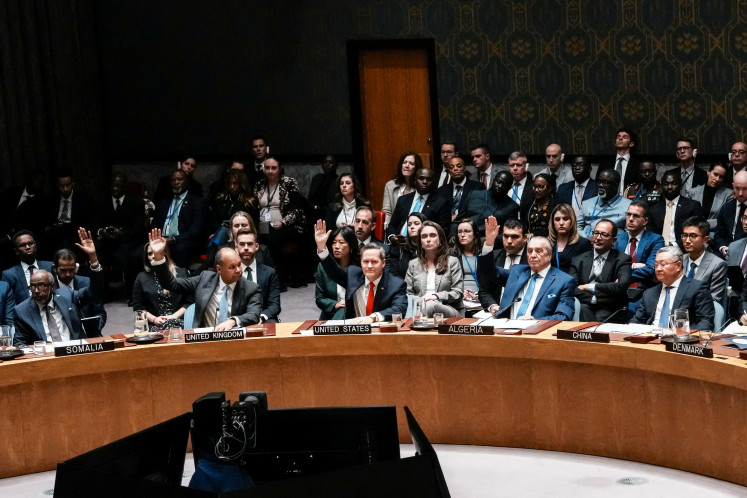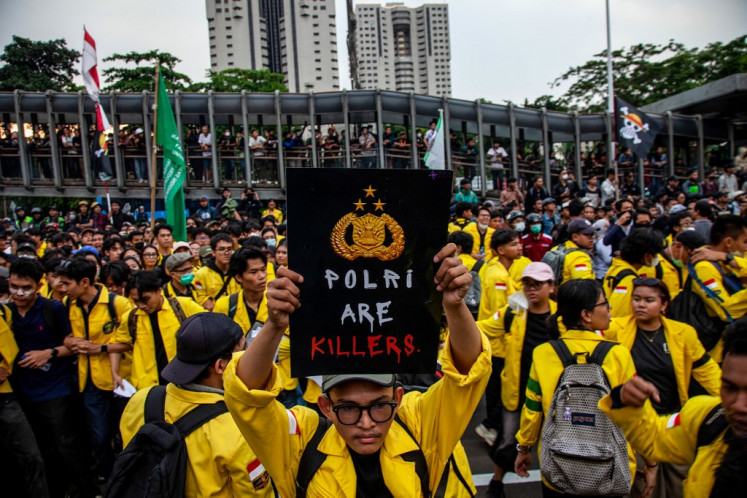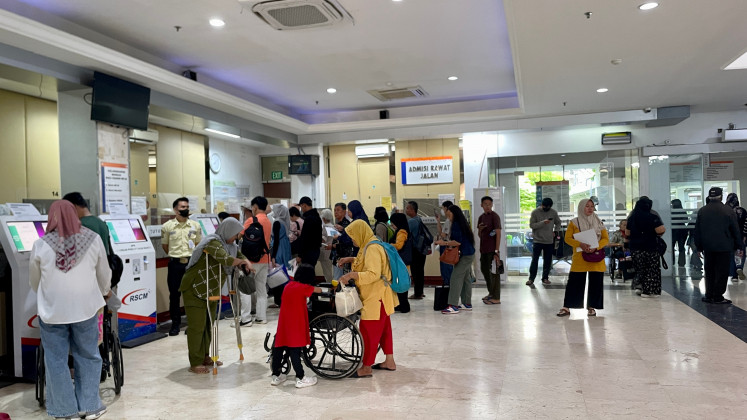Popular Reads
Top Results
Can't find what you're looking for?
View all search resultsPopular Reads
Top Results
Can't find what you're looking for?
View all search resultsBroken promises let Papuans down
Conditional love: Joko “Jokowi” Widodo (sporting headdress) is welcomed with an indigenous dance as he arrives at the Sentani Airport in Jayapura, Papua, as part of his presidential campaign on June 5, 2014
Change text size
Gift Premium Articles
to Anyone
C
span class="caption">Conditional love: Joko “Jokowi” Widodo (sporting headdress) is welcomed with an indigenous dance as he arrives at the Sentani Airport in Jayapura, Papua, as part of his presidential campaign on June 5, 2014. Improvements that Jokowi promised have come painfully slowly, risking the rapport that he built with locals.(Antara/Widodo S. Jusuf)
President Joko “Jokowi” Widodo is having a hard time fulfilling his election promises in restive, impoverished Papua. The Jakarta Post’s Margareth S. Aritonang, Nethy Dharma Somba and Pandaya found that poor coordination among the President’s aides, continuing violence and the lack of trust in the central government among Papuan natives have left long-standing delicate issues unresolved.
In the midst of shrubs and tall grass, a flimsy hut stands unattended in one corner of a vacant patch of land in the Sentani area of Jayapura, Papua. The structure was built last year for workers on a project that was supposed to turn the 62-hectare property into a sports complex with a 40,000-capacity stadium, about half the size of Jakarta’s Bung Karno Stadium.
It was going to be the realization of President Joko “Jokowi” Widodo’s dream to make Jayapura the soccer capital of Indonesia as part of his much-lauded “look to Papua” vision. Local people celebrated when Jokowi laid the cornerstone last May of the gigantic project that would cost Rp 1.2 trillion (US$91 million).
Alas, a few days before the work was about to begin, there arrived Yan Puhiri, the Puhiri tribal chief, to block the entrance to the property, which he claimed was his communal property. He vowed never to surrender the land until the government met his demand for Rp 465 billion in compensation.
Now, the abandoned hut is a testament to Jokowi’s broken dreams. And it is only one of his big campaign promises that have turned sour and eroded the budding mutual trust they had built up ever since he set foot for the first time in the land he calls “a little heaven on Earth”.
Elsewhere in Jayapura, the location earmarked for a women’s market has also been left standing high and dry due to land-acquisition red tape that requires the House of Representatives and State-Owned Enterprises Ministry’s legal intervention to resolve.
“Perhaps the cornerstone that Jokowi laid there during the groundbreaking ceremony is already gone as well,” quipped Robert Jitmau, a Papua Solidarity activist.
Unfulfilled promises — from the sports stadium, a women’s market and a waterfront presidential palace to a resolution of the numerous cases of gross violations of human rights and new infrastructure – have increasingly deflated the once buoyant faith that Jokowi had carefully created in the hearts of Papuans.
Jokowi spellbound the Papuans when he waged his 2014 presidential campaign in the vast, resource-rich but underdeveloped easternmost territory. Welcomed like a messiah, he was the first presidential hopeful to have campaigned in the provinces (Papua and West Papua), which have been beset by conflict by armed secessionists since it became part of Indonesia in 1963.
He managed to win the locals’ hearts and minds with his promises of prosperity, a non-militaristic approach and uplifting the dignity of Papuans, who have suffered decades of repression, poverty and discrimination, which have left them feeling like second-class citizens. His new approach was hailed as a breakthrough in the efforts to restore Papuans’ long-lost trust.
The immediate result was stunning: He and his running mate Jusuf Kalla swept 73 percent of votes in the two provinces, the pair’s largest margin nationwide.
Papuan leaders declared then that Jokowi was the only central government leader they would trust and hung on him their hopes for peace and prosperity.
To show his sincerity, Jokowi promised to visit at least three times a year so that he could have direct control of all the programs he personally designed for Papua. He planned to build a railway and highways linking major Papuan cities to end isolation, traditional markets to invigorate local economies, allow foreign journalists better transparency and construct sports facilities, among other developments.
Last June, Jokowi granted amnesty to five political detainees linked to the Free Papua Movement (OPM) in a gesture of political will to resolve the armed conflict.
“He wants to personally check on every development of all programs and make sure that everything is well-coordinated among the government institutions involved,” says Jaleswari Pramodawardhani, head of the Presidential Chief of Staff’s Office in charge of human rights, political and security issues in Papua.
But the short patience of Papuans is well-known. They had wanted see the President “work, work, work” as he has always preached, to get things done as soon as possible but after 18 months at the helm with many promises having yet to materialize, many Papuans say they are losing faith in him.
What has been immediately apparent as a reason for the flop is the poor coordination between government authorities in both Jakarta and Papua — a classic problem that also occurred during the administration of Jokowi’s predecessors.
As part of his hands-on tactics, Jokowi dissolved the Special Unit of Acceleration of Development in Papua and West Papua (UP4B) set up by the then president Susilo Bambang Yudhoyono.
Last year, Jokowi picked Lenis Kogoya, a native Papuan tribal chief, as an adviser. The President is also supported by the Presidential Chief of Staff’s Office, which has two deputies, Darmawan Prasodjo who is in charge of infrastructure development projects, and Jaleswari, who oversees peace building and human rights.
Unfortunately, Jokowi’s aides in charge of Papua lack coordination. Darmawan, Jaleswari and Lenis answer to Jokowi individually instead of working as a solid team. Communication between them occurs only during closed-door meetings with the President, according to officials familiar with the President’s inner circle.
Albeit a native Papuan, Lenis is little known among the indigenous Papuans largely because of the diverse sub-ethnic communities scattered across the two provinces.
Yudhoyono had teams to assist him oversee development programs in Papua and reach out to rebel groups that the military has often used to justify the use of violence. His main team was the UP4B headed by retired Army general Bambang Darmono, who was assigned to coordinate, synchronize, facilitate, evaluate and monitor all the government’s development programs in Papua.
Aside from the UP4B, Yudhoyono also appointed a team of special envoys chaired by medical doctor Farid Husain in 2010 to reach out to members of the OPM to pave the way for peace dialogue with Jakarta. But Yudhoyono’s efforts were discontinued when his term ended, and the comprehensive report Farid submitted to Yudhoyono has lain unread.
In an interview with The Jakarta Post, Farid revealed that one of his most egregious findings, after two years of interaction with OPM rebels, was that the Papuans’ determination to achieve independence had only strengthened in spite of all of Jakarta’s well-intentioned plans to develop the provinces.
Since the central government granted special autonomy status to Papua in 2002 with the main aim of alleviating poverty and promoting peace, Jakarta has funneled Rp 67 trillion. But, 14 years on, most Papuans still live in abject poverty. Public services such as health and education remain poor while corruption is rampant. Former governor Barnabas Suebu and Boven Digoel regent Yusak Yaluwo are among local officials who have been imprisoned for graft.
Security remains a basic issue despite Jokowi’s pledge. The latest well-documented incidents happened on Dec. 27, just three days ahead of Jokowi’s year-end visit, when gunmen attacked a police post in Puncak regency, killing three officers. Earlier on Dec. 1, police shot dead four civilians for raising the separatist Bintang Kejora (Morning Star) flag.
Countless cases of gross human rights violations remain unresolved. Investigations are going nowhere because the police, the National Commission on Human Rights (Komnas HAM) and the military usually form their own investigative teams instead of working together as a joint force.
Despite all the pitfalls, Jokowi looks set to keep on trying to mend his rapport with Papua and the people he admires so much, as he has expressed in various occasions.
Maybe he will have to prove his sincerity by building the Mamas’ Market to please the very demanding women and kicking off the giant sports stadium project to allow youths to let off steam playing soccer instead of toting guns.
But perhaps Papuans, too, should give Jokowi more time to deliver on his promises.
__________________________________________
Lofty promises
* Resolving human rights violations, including two cases declared as gross rights abuses in Wasior and Wamena
* Ending use of force by security forces
* Releasing political detainees
* Regular visits to Papua
* Building presidential palace in Papua
* Building traditional women’s markets (Mama’s Market)
* Opening Papua to foreign journalists
* Developing infrastructure
Progress so far
* Cases of rights violations remain unsolved. Shooting incidents that claim the lives of civilians and security forces still occur. The legal process lacks transparency. There have been at least five shooting incidents since Jokowi paid his first visit to Papua as president in December 2014.
* Locals still fear police and military due to continuing violence. An unresolved shooting that left five civilians dead and 21 injured in Paniai regency in December 2014 shows that the use of force by the military and police remains unchecked.
* Jokowi granted clemency to five political prisoners in May 2015. He is expected to free all political detainees.
* Jokowi has regularly visited Papua and kept his promise to visit the easternmost provinces three times a year.
* The Presidential Chief of Staff’s Office says building a presidential palace in Papua is not a priority at present.
* Two women’s markets have been built in Sorong in West Papua and Sentani in Papua. But, the construction of another one in Jayapura in Papua has yet to start due to land-acquisition problems.
* A feasibility study for the construction of a railway in Sorong has been ongoing since last year and is expected to be completed this year.
Source: From Various Sources










